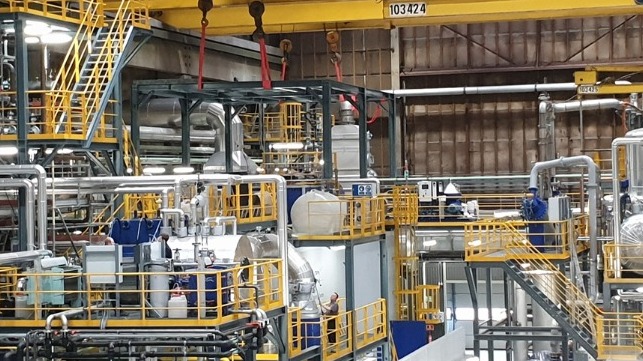Methanol Fuel Cell Test with Alfa Laval, DFDS, Maersk Drilling, Hafnia

Testing is beginning on a new generation of methanol-fueled high-temperature membrane full cell as part of a program to accelerate the commercialization of the technology as an auxiliary marine power source. During a year of planned testing at the Alfa Laval Test & Training Centre, the fuel cell system’s durability and lifetime will be in focus while working with DFDS, Maersk Drilling, and Hafnia to develop the operational and implementation aspects for the fuel cell technology.
The fuel cell system is based on high-temperature proton exchange membrane (HTPEM) technology, which according to its developer Blue World Technologies of Denmark, has a higher tolerance for thermal cycling than other fuel cell types. They believe it is well suited to the variable power production needed from a genset. The test will seek to understand the lifespan of the technology that needs to be comparable to that of combustion technologies to be feasible on board. They will address various sources of performance degradation to establish a highly efficient and cost-effective HTPEM fuel cell solution.
“Building on the scalability of automotive applications, we are convinced that methanol fuel cell systems can drastically reduce maritime climate and environmental impact,” said Mads Friis Jensen, Chief Commercial Officer and Co-founder, Blue World Technologies. “By further developing our technology in partnership with marine colleagues, and by ramping up our production capacity at the same time, we can deliver a fuel cell solution that is green, operationally sound, and also commercially viable.”
The fuel cell test setup will have a power of 200 kW, but the fully developed and modular design should according to Blue World be possible to scale up incrementally to a level of 5 MW. The test installation, which is funded by the Danish EUDP (Energy Technology Development and Demonstration Program), will use methanol as fuel, as it is a readily available fuel source and one of the most promising fossil-free fuels already being used in testing at the Alfa Laval Test & Training Centre. The fuel cell system concept, however, Blue World says could possibly be adapted for fuels such as LNG and ammonia.
Three vessel owners, DFDS, Maersk Drilling, and Hafnia, will contribute insights regarding the operational and commercial implementation of the HTPEM fuel cell system. DFDS is also working on other fuel cell projects, while Maersk Drilling has experience using auxiliary power for special applications, and Hafnia provides experience in methanol bunkering and operations.
Alfa Laval views this project as another step alongside its efforts with solid oxide fuel cells and methanol combustion, will manage and coordinate the project in addition to supplying the innovation resources of the Alfa Laval Test & Training Centre. Blue World Technologies is ramping up for the mass production needed to bring fuel cells into cost parity with combustion-based solutions.
